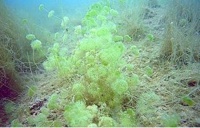Difference between revisions of "Category:Macrophytes and phytobenthos"
| (6 intermediate revisions by the same user not shown) | |||
| Line 1: | Line 1: | ||
=BQE: Macrophytes and phytobenthos= | =BQE: Macrophytes and phytobenthos= | ||
| − | |||
| − | |||
| − | |||
<table width="100%"> | <table width="100%"> | ||
| Line 8: | Line 5: | ||
<td> | <td> | ||
[[Image:BQE_macrophytes.jpg|200px]] | [[Image:BQE_macrophytes.jpg|200px]] | ||
| + | <ref>[http://www.wiser.eu/background/macrophytes/ WISER Project EU. Macrophytes and phytobenthos]</ref> | ||
</td> | </td> | ||
<td> | <td> | ||
| − | Macrophytes are all aquatic higher plants, mosses and characean algae, but excluding single celled phytoplankton or diatoms | + | '''Macrophytes''' are all aquatic higher plants, mosses and characean algae, but excluding single celled phytoplankton or diatoms <ref> [http://www.wfduk.org/wfd_concepts/CIS_Glossary WFD-UKTAG,Terms and definitions under Water Framework Directive ]</ref>. Common parameters used for characterization are taxon composition and abundance of sensitive to non-sensitive species. |
| − | Phytobenthos are vascular plants, heterotrophic organisms and photosynthetic algae (including cyanobacteria) living on or attached to substrate or other organisms in surface waters.<ref> [http://www.wfduk.org/ | + | '''Phytobenthos''' are vascular plants, heterotrophic organisms and photosynthetic algae (including cyanobacteria) living on or attached to substrate or other organisms in surface waters. Common parameters used for characterization are composition and abundance, growth rate, undesirable disturbance or balance of organisms, and bacterial tufts <ref> [http://www.wfduk.org/tag_guidance/Article_08/WP11k-guid WFD-UKTAG, Development of biological classification tools to support assessment and monitoring of ecological status under WFD]</ref>. |
| − | + | ||
</td> | </td> | ||
</tr> | </tr> | ||
</table> | </table> | ||
| + | <p>The list of case studies where this BQE has been considered is presented at the bottom of the page under '''Pages in category "Macrophytes and phytobenthos"'''. Click on the name of the case study to see more information. </p> | ||
==References:== | ==References:== | ||
<references/> | <references/> | ||
| − | |||
| − | |||
| − | |||
| − | |||
Latest revision as of 09:57, 28 April 2010
BQE: Macrophytes and phytobenthos
|
Macrophytes are all aquatic higher plants, mosses and characean algae, but excluding single celled phytoplankton or diatoms [2]. Common parameters used for characterization are taxon composition and abundance of sensitive to non-sensitive species. Phytobenthos are vascular plants, heterotrophic organisms and photosynthetic algae (including cyanobacteria) living on or attached to substrate or other organisms in surface waters. Common parameters used for characterization are composition and abundance, growth rate, undesirable disturbance or balance of organisms, and bacterial tufts [3]. |
The list of case studies where this BQE has been considered is presented at the bottom of the page under Pages in category "Macrophytes and phytobenthos". Click on the name of the case study to see more information.
References:
- ↑ WISER Project EU. Macrophytes and phytobenthos
- ↑ WFD-UKTAG,Terms and definitions under Water Framework Directive
- ↑ WFD-UKTAG, Development of biological classification tools to support assessment and monitoring of ecological status under WFD
Pages in category "Macrophytes and phytobenthos"
The following 88 pages are in this category, out of 88 total.
